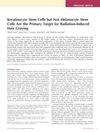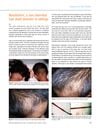 15 citations,
January 1988 in “Drugs”
15 citations,
January 1988 in “Drugs” The document concludes that treatments for female hair loss and excessive hair growth are temporary and not well-studied.
 October 2023 in “Georgetown medical review”
October 2023 in “Georgetown medical review” Finasteride and Dutasteride can improve hair growth in male baldness but may cause temporary sexual dysfunction and possibly affect fertility.
February 1978 in “PubMed” Some birth control pills can cause temporary or more serious hair loss.
 101 citations,
November 1992 in “Archives of Dermatology”
101 citations,
November 1992 in “Archives of Dermatology” Steroids help hair regrowth, and minoxidil slows post-steroid hair loss, but effects are temporary.
February 2022 in “Cosmetic Dermatology” Permanent hair waving uses chemicals to create long-lasting curls.
 September 2019 in “International journal of research in ayurveda and pharmacy”
September 2019 in “International journal of research in ayurveda and pharmacy” Ayurvedic treatment with Bhringraj Vati and coconut oil was safe and effective for reducing hair fall.
 115 citations,
November 1999 in “Journal of The American Academy of Dermatology”
115 citations,
November 1999 in “Journal of The American Academy of Dermatology” Minoxidil increases hair weight and count temporarily in men with hair loss.
51 citations,
March 2001 in “Clinics in dermatology” Bleaching damages hair, making it rougher and weaker.
 30 citations,
April 2013 in “Journal of Investigative Dermatology”
30 citations,
April 2013 in “Journal of Investigative Dermatology” Radiation mainly affects keratinocyte stem cells, not melanocyte stem cells, causing hair to gray.
30 citations,
August 1993 in “PubMed” IL-1 alpha stops hair follicle growth and hair production.
 20 citations,
September 1978 in “International Journal of Dermatology”
20 citations,
September 1978 in “International Journal of Dermatology” Hair growth is influenced by factors like genetics and nutrition, and more research is needed to understand hair loss and growth mechanisms.
 17 citations,
November 2012 in “Maturitas”
17 citations,
November 2012 in “Maturitas” The conclusion is that proper evaluation and treatment of hair loss in midlife women is important, considering the emotional impact and potential for various treatments.
15 citations,
June 1961 in “Archives of Dermatology” Triamcinolone can regrow hair in alopecia areata, but the effect is temporary.
11 citations,
March 2012 in “Journal of the American Academy of Dermatology” Most patients with dark skin were satisfied with laser hair removal and had few complications.
 10 citations,
December 1997 in “Plastic and Reconstructive Surgery”
10 citations,
December 1997 in “Plastic and Reconstructive Surgery” Hair restoration surgery has improved with better techniques for natural looks and managing patient expectations, but it remains labor-intensive and requires careful consideration of potential complications.
 8 citations,
March 1979 in “International Journal of Dermatology”
8 citations,
March 1979 in “International Journal of Dermatology” Dr. Vera H. Price's 1979 work emphasizes the importance of accurate diagnosis and personalized treatment for hair loss.
 4 citations,
January 2014 in “Indian dermatology online journal”
4 citations,
January 2014 in “Indian dermatology online journal” Monilethrix is a genetic hair disorder causing fragile, beaded hair with no effective treatment.
 3 citations,
April 2022 in “Clinical, Cosmetic and Investigational Dermatology”
3 citations,
April 2022 in “Clinical, Cosmetic and Investigational Dermatology” Different methods, including stress management, healthy diet, supplements, and treatments like minoxidil, can help hair grow back after COVID-19 related hair loss.
 3 citations,
April 2020 in “Facial Plastic Surgery Clinics of North America”
3 citations,
April 2020 in “Facial Plastic Surgery Clinics of North America” Beard hair transplantation is generally satisfying, requires 250-800 grafts, uses FUE to avoid scars, needs careful planning, has some risks, and hair regrowth starts after 4-6 months.
 3 citations,
October 1982 in “Postgraduate Medicine”
3 citations,
October 1982 in “Postgraduate Medicine” Most types of hair loss can regrow naturally, but there are no effective cures for male pattern or age-related hair loss, and only limited options for females.
 1 citations,
July 2023 in “Advances in therapy”
1 citations,
July 2023 in “Advances in therapy” Hair transplantation is safe and effective for children with scar-related hair loss.
 1 citations,
January 1967 in “The BMJ”
1 citations,
January 1967 in “The BMJ” The document concludes that while some hair and scalp disorders can be treated, hair loss from destroyed follicles is permanent, and damaged hair can only regrow naturally.
 December 2023 in “JEADV Clinical Practice”
December 2023 in “JEADV Clinical Practice” A woman's hair grew back with baricitinib treatment, but she developed a temporary hairy tongue that was treated with regular tongue brushing.

The document concludes that activating hair roots is important for improving hair growth and preventing hair loss.
February 2022 in “Cosmetic Dermatology” Different hair care methods affect hair health and appearance, and there are many ways to camouflage hair loss.
 August 2021 in “International Journal of Research in Dermatology”
August 2021 in “International Journal of Research in Dermatology” Modern hair straightening improves manageability and strength while maintaining natural waves.
PRP hair treatment is generally safe but may cause minor pain, bleeding, redness, and scalp tightness, and isn't suitable for everyone.
 January 2017 in “Springer eBooks”
January 2017 in “Springer eBooks” Over 40% of postmenopausal women experience hair loss, with treatments aiming to stop further loss and possibly thicken hair.
 July 2002 in “Dermatologic Surgery”
July 2002 in “Dermatologic Surgery” Some people's hair turned white or gray after using intense pulsed light for hair removal, and for some, it was permanent.
 166 citations,
September 2011 in “Dermatologic Surgery”
166 citations,
September 2011 in “Dermatologic Surgery” Platelet-rich plasma with a new carrier significantly increases hair thickness without serious side effects.






















